Religiously unaffiliated Americans have grown significantly in number over the past decade. PRRI’s 2023 Religious Change survey examined the reasoning behind higher levels of disaffiliation and found that the reason given by the largest percentage of religiously unaffiliated Americans for leaving their faith tradition is that they simply stopped believing in their religion’s teachings (67%). This Spotlight dives deeper into religiously unaffiliated Americans’ party affiliation and level of political engagement ahead of the 2024 election.
Religiously Unaffiliated Breakdown from 2013-2023
Nearly three in ten Americans identified as religiously unaffiliated in 2023 (27%), which is an increase of 6 percentage points from 21% in 2013. Among unaffiliated breaks, the proportion of atheist and agnostic Americans has increased by 3 percentage points from 2% each in 2013 to 5% each in 2023. While the percentage of unaffiliated Americans who identify as “nothing in particular” has remained fairly consistent over the past decade, it reached a high of 19% in 2018 before returning to 17% in 2023.
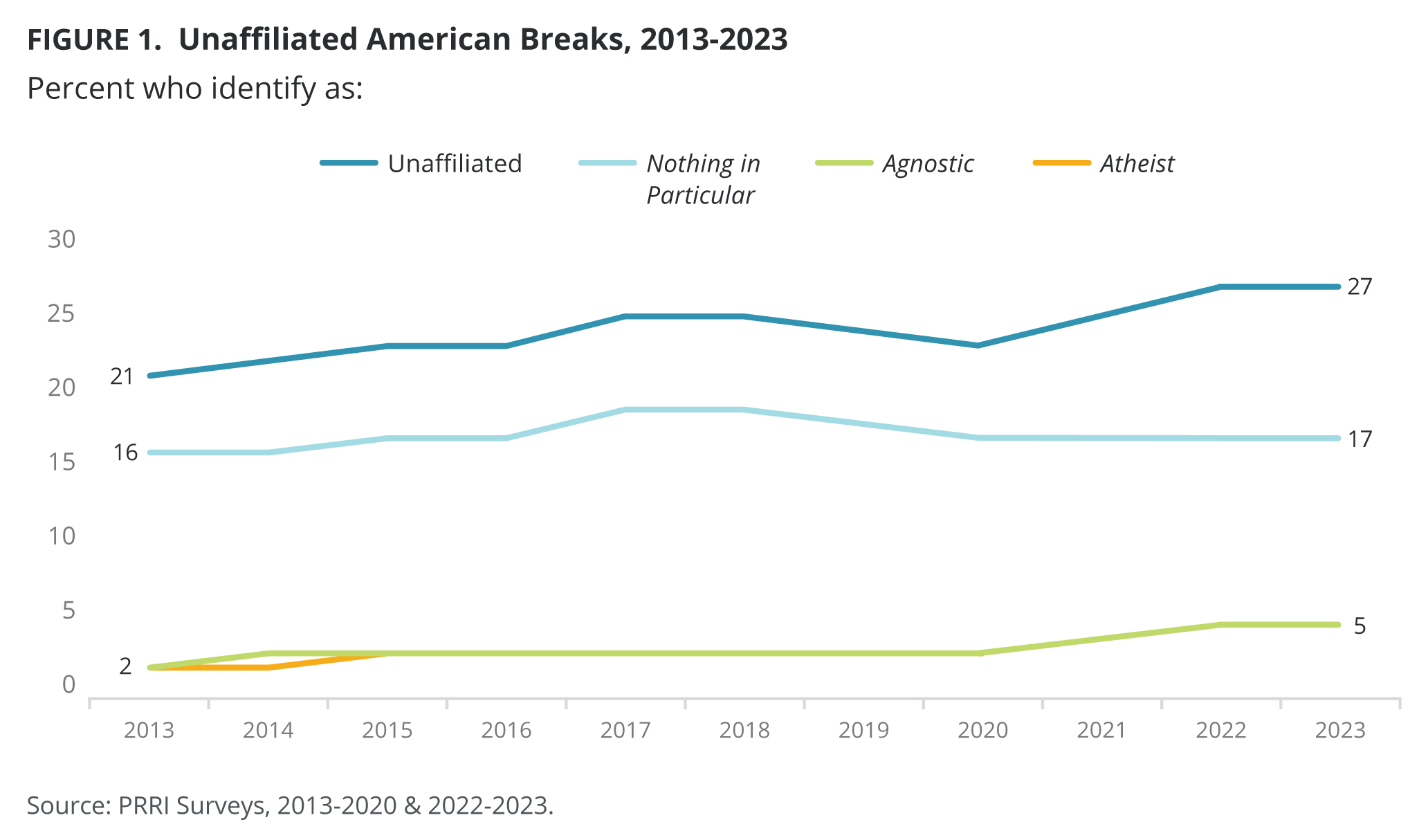
Party Affiliation Among Unaffiliated Americans from 2013-2023
In the last decade, the percentage of religiously unaffiliated Americans who identified as Democrats has increased from one-third (32%) in 2013 to nearly four in ten (38%) in 2023. In contrast, the share of unaffiliated Americans who identify as independent has decreased by 16 percentage points from a high of 50% in 2014 to around one-third (34%) in 2023. The proportion of religiously unaffiliated Americans who identify as Republican has remained relatively consistent over the past decade with a high of 16% in 2019 but returning to 12% in 2023.[1]
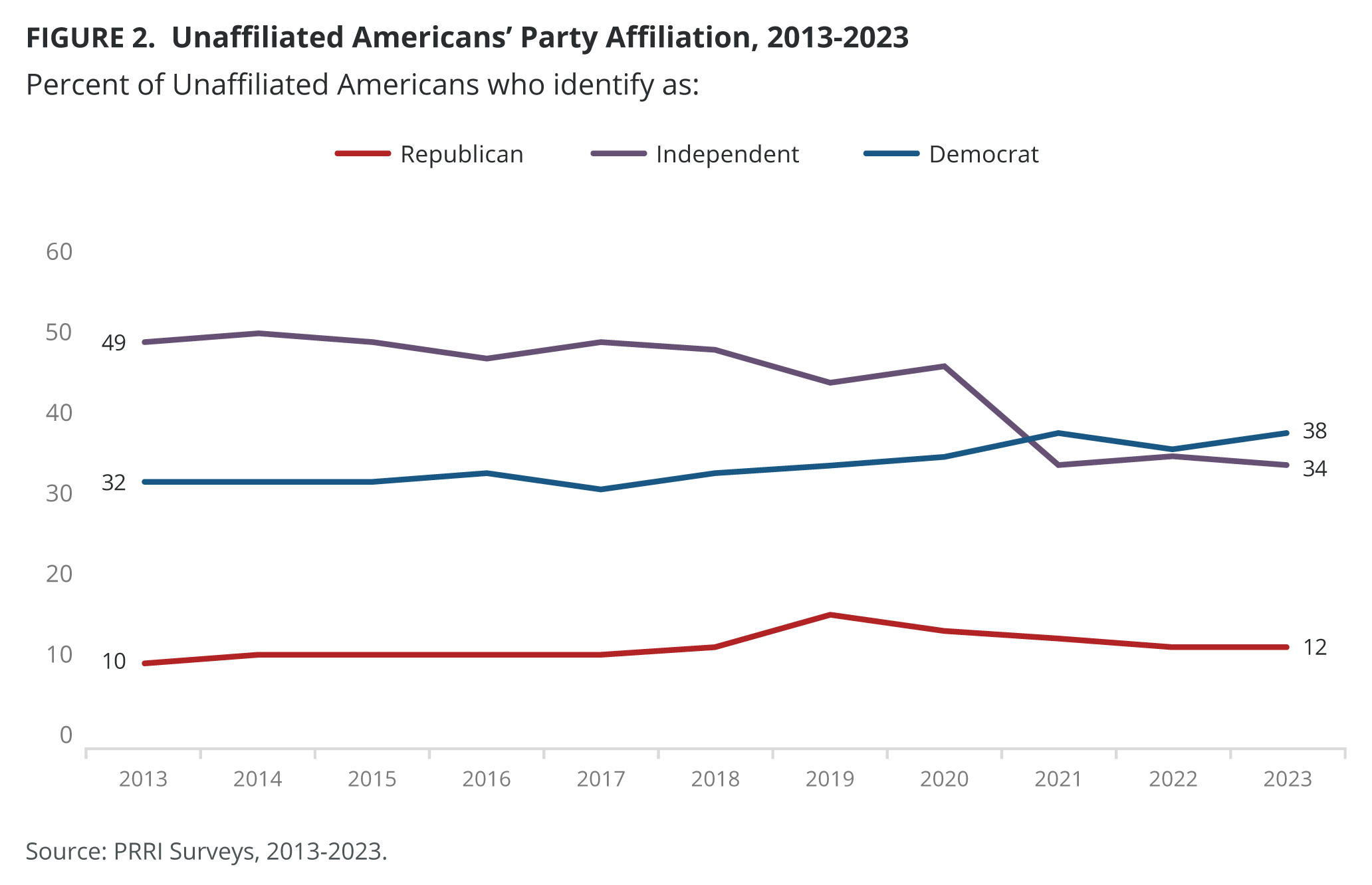
Favorability of Biden
In 2023, before President Joe Biden announced his decision to withdraw from the 2024 presidential race, fewer than half of Americans who identify as nothing in particular (46%) showed favorable views of Biden, a notable decline from 52% in 2020. In contrast, there has been a 9 percentage point increase in Biden’s favorability among atheist Americans from 61% in 2020 to 70% in 2023. There are no notable differences among agnostics or religiously unaffiliated Americans as a whole.
In the past three years, religiously unaffiliated women became less likely to favor Biden, from 64% in 2020 to 53% in 2023. There are no significant shifts among unaffiliated by age, race, or education level over the past three years.
Favorability of Trump
Favorable views of former President Donald Trump among religiously unaffiliated Americans have decreased by 10 percentage points in the past three years, from 30% to 20%. Among unaffiliated Americans, atheists show a significant drop in Trump favorability levels from 20% in 2020 to 9% in 2023. Declines also registered among Americans who identify as nothing in particular from 34% to 25% and agnostics from 20% to 14%.
There have been significant drops in Trump favorability levels across all unaffiliated demographic groups over the past three years, except for Black, Hispanic, and women unaffiliated Americans, who have changed less markedly since 2020. Religiously unaffiliated Americans aged 65 or older (30% in 2020 to 16% in 2023) and unaffiliated men (35% in 2020 to 22% in 2023) account for the largest decrease in Trump favorability among unaffiliated Americans.
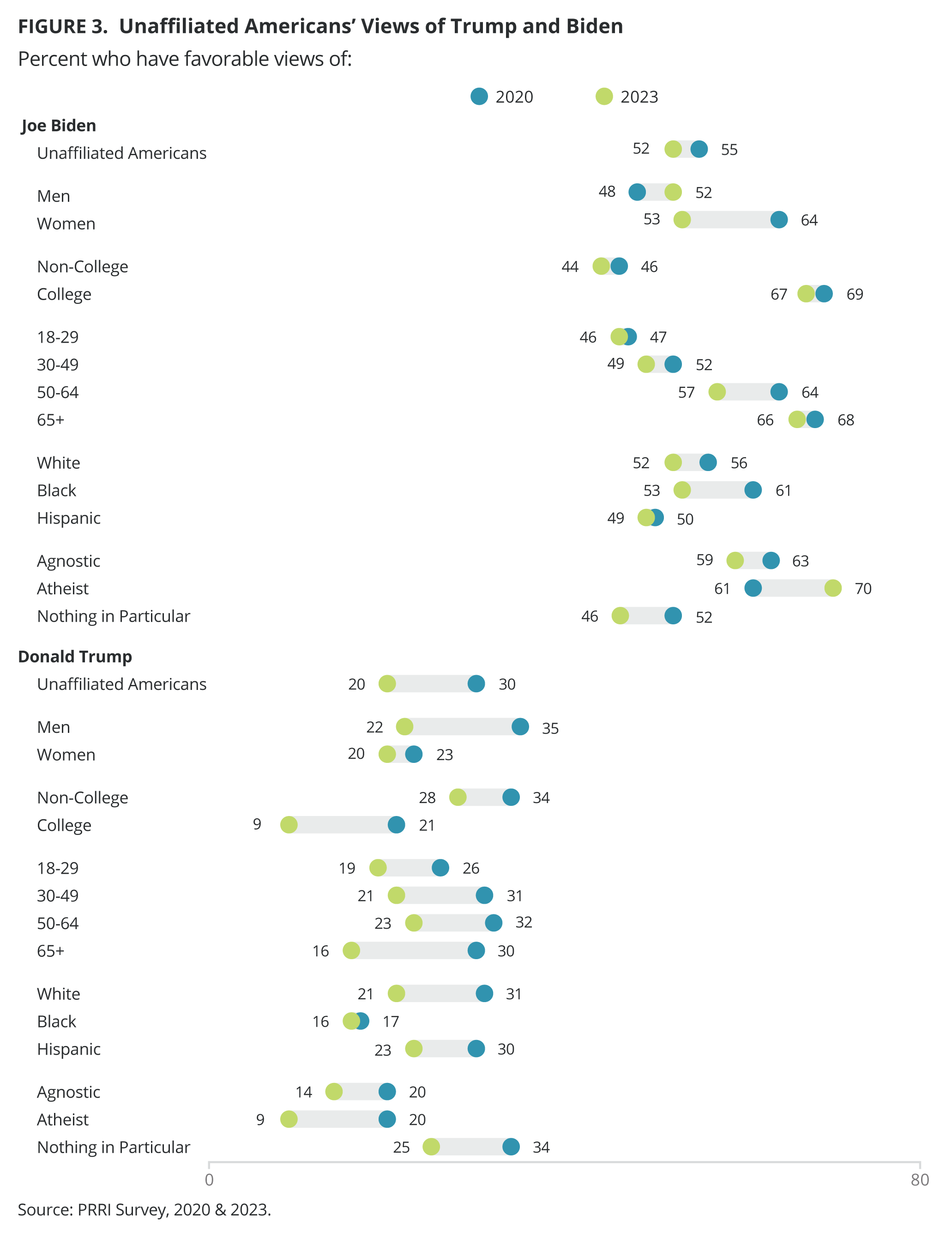
Political Engagement of Unaffiliated Subgroups
What Are Unaffiliated Americans Voting on?
Abortion legality emerges as the most salient issue for unaffiliated Americans: 44% say they will only vote for a candidate who shares their views. Similar percentages say the same for LGBTQ Rights (39%), climate change (38%), and access to guns (38%). Unaffiliated Americans are less likely to say they would only vote for a candidate who shared their views on immigration (27%).
Among the unaffiliated, nearly six in ten atheists (58%) say they will only vote for a candidate who shares their views on abortion, compared with almost half of agnostics (48%) and about four in ten Americans who identify as nothing in particular (39%).
A similar pattern emerges with regards to the political salience of climate change and LGBTQ rights. Slim majorities of atheists (52% and 51% on the issues respectively), over four in ten agnostics (42% and 45% respectively,) and around one-third of Americans who identify as nothing in particular (32% and 34% respectively) say they will only vote for a candidate who shares their view on these matters.
Atheists (43%) and agnostics (40%) are more likely than Americans who identify as nothing in particular (36%) to say they will only vote for a candidate who shares their views on access to guns. Similar percentages of atheist (27%) and agnostic (26%) respondents, and those who identify as nothing in particular (28%) say they will only vote for a candidate who aligns with their views on immigration.
Online Activism
PRRI’s Gen Z survey reveals that atheist and agnostic Americans report higher levels of participation in online activism when compared with unaffiliated Americans who identify as nothing in particular. Just under half of agnostic Americans (46%) and four in ten atheist Americans (38%) report having signed an online petition over the past year. This pattern continues with similar percentages of atheist and agnostic Americans who report having: “liked” or followed a campaign or organization online (38% and 31% respectively); posted on social media about an issue that mattered to them (39% and 38%); encouraged others to be politically active on social media (22% for both populations); and followed the social media profile of political candidates or groups whose views differ from their own (20% and 19%).
In comparison, only about one-quarter of unaffiliated Americans who identify as nothing in particular posted on social media about an issue that mattered to them (26%) or report having signed an online petition (25%). Similarly, either two in ten or fewer of those who identify as nothing in particular report having liked or followed a campaign or organization online (20%); encouraged others to be politically active on social media (13%); and followed the social media profile of political candidates whose views differ from their own (12%) within the past twelve months.
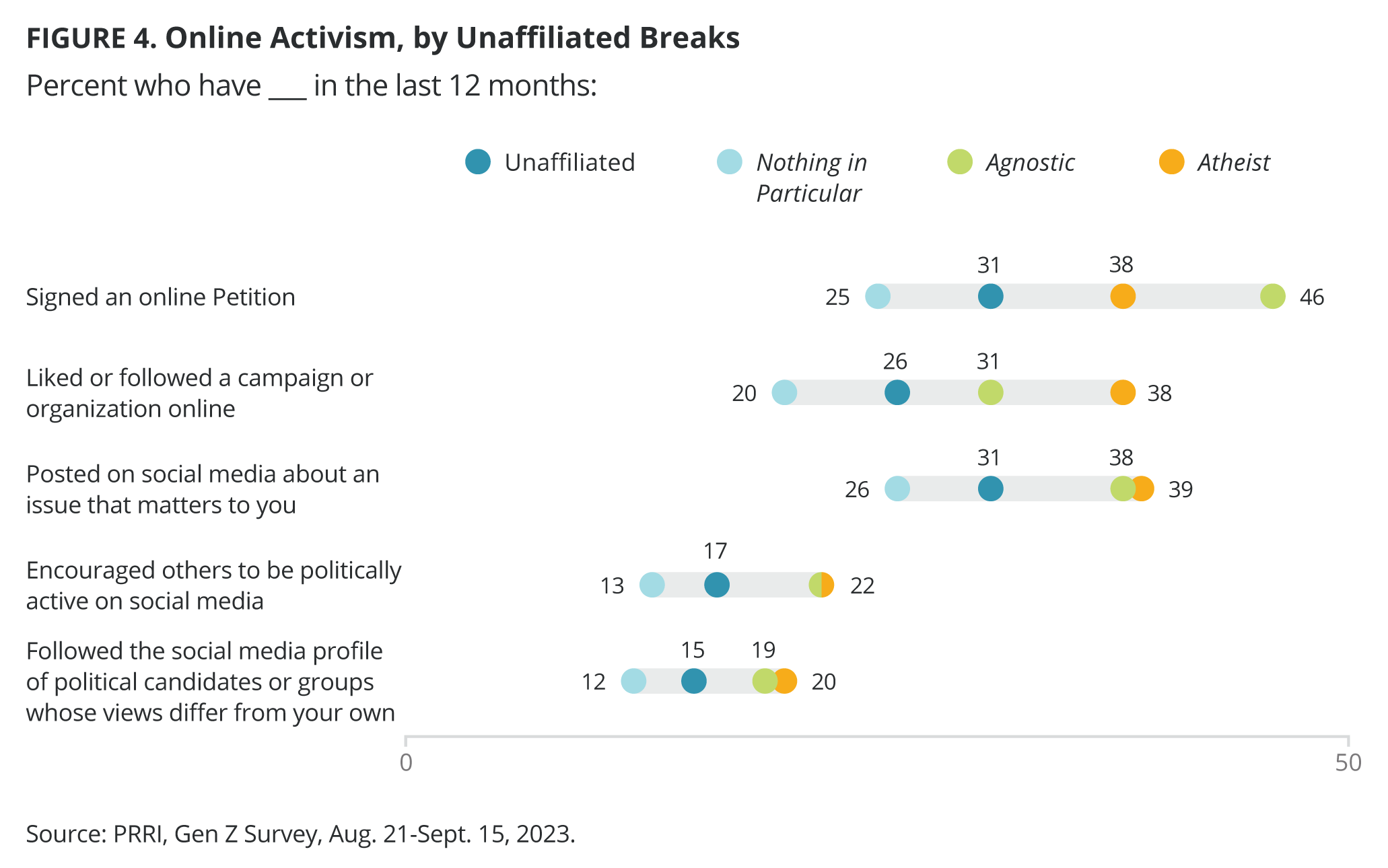
Offline Activism
The difference among unaffiliated subgroups lessens with regards to participation in offline activism activities. About one in ten atheists (14%), agnostics (11%), and those who identify as nothing in particular (10%) report having attended a public rally or demonstration within the past 12 months. Nearly three in 10 atheists (27%) and agnostics (26%) report volunteering for a group or cause within the last year, compared to 20% of those who identify as nothing in particular. One quarter of atheists (27%), along with 22% of agnostics and 16% of those who identify as nothing in particular say they have contacted an elected official. Finally, 18% of atheists, 13% of agnostics, and 11% of Americans who identify as nothing in particular report attending a community meeting within the past year.
Atheists (48%) and agnostics (46%) are more likely than those who identify as nothing in particular (35%) to have avoided buying a particular product or brand in the prior year.
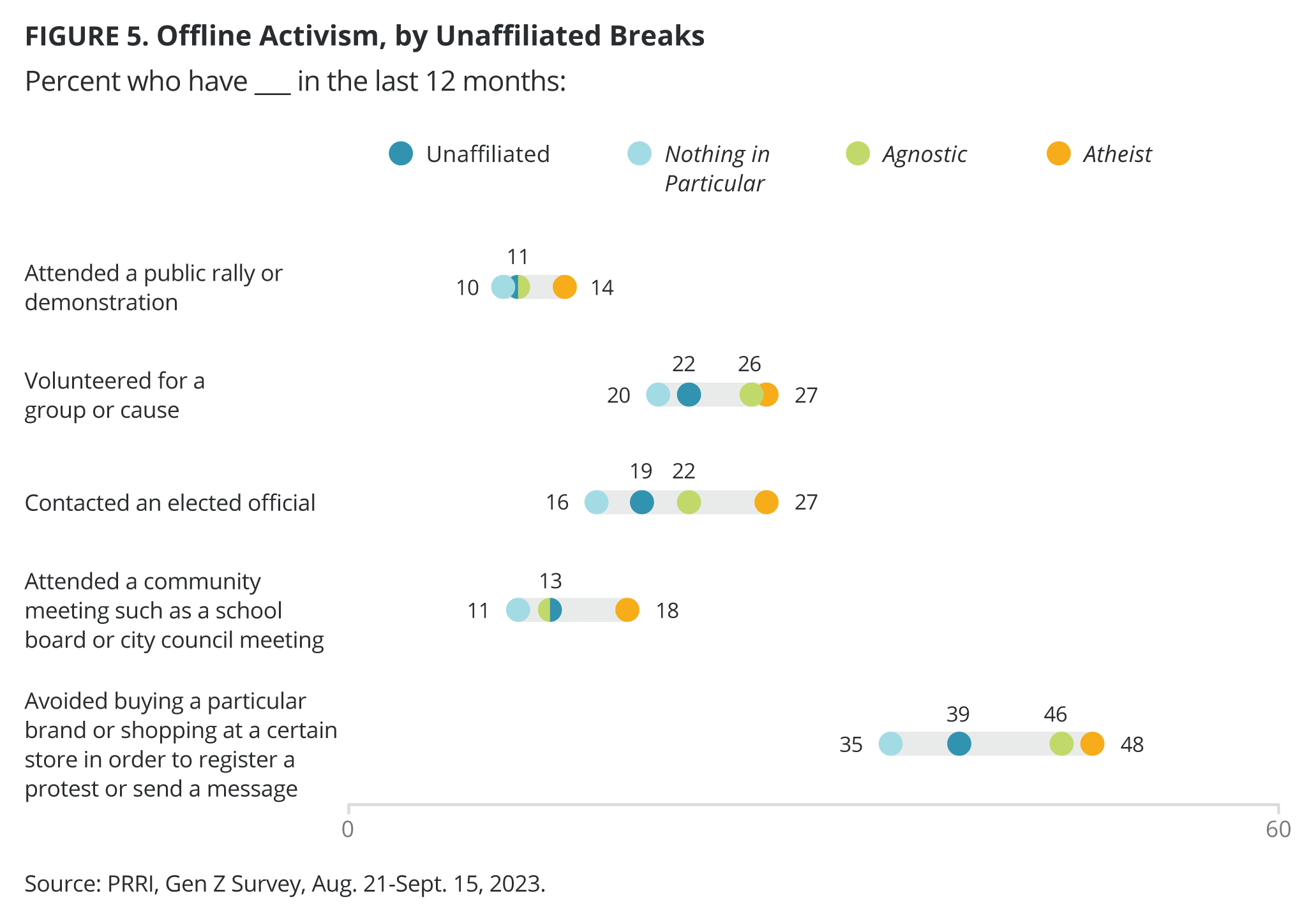
[1] Religiously unaffiliated Americans mostly identify as Democrat, independent, or Republican, but a smaller percentage identify with “other party” or refused to answer. This percentage level has nearly doubled over the past decade from 9% in 2013 to 17% in 2023.





